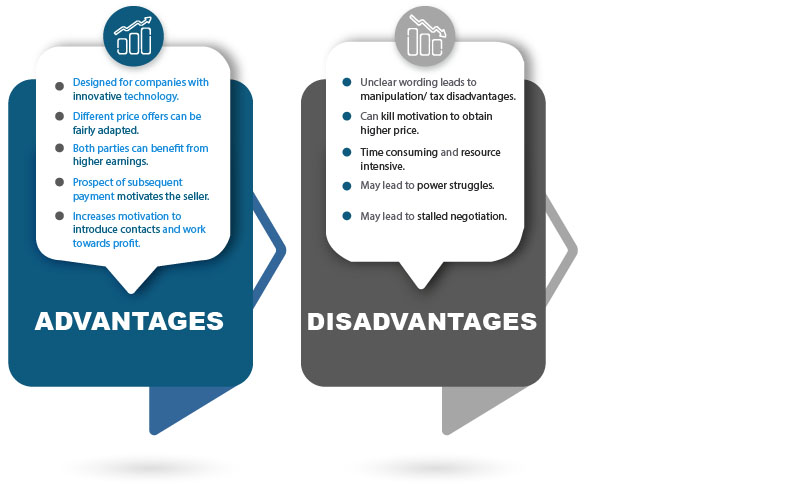What role does the earn-out clause play in the sale of a company?
In a company selling negotiation, it is rare that the buyer and seller agree on the price since each party’s expectations for future earnings do not always align. The seller seeks to maximize the company’s potential while the buyer is particularly concerned about the dangers associated with the acquisition, which causes a considerable disparity in what each party anticipates the price to be. It is for this reason that using the earn-out clause in the sales agreement as a payment method might be preferred by both parties.
The earn-out clause, which may be included in company purchase and sale contracts as a payment method, establishes that a portion of the transaction price will be variable and will depend on how the acquired business performs for a specified period of time after the sale.
What does the earn-out clause do?
This clause is in place to bridge value disputes between buyer and seller as well as to achieve a price agreement that is satisfactory to both parties. It is where the seller receives a fixed amount and a variable amount which depends on the company´s profit. The sale agreement should state how each earn-out is to be calculated and that the calculation be carried out by an impartial consulting company that is satisfactory to both parties. This is because certain earn-outs are based on numbers that the buyer could potentially manipulate, such EBITDA.
Your buyer should guarantee the following items after the sale if an earn-out clause is included in a selling agreement as the payment method:
- The retaining of key employees
- Not interfering with operations
- Maintaining specified capacities
- Not delocalising work
- Not disqualifying an offer
- Limiting the buyer’s personal compensation
In any event, we recommend to keep earn-outs as simple as possible in order to minimize complexity in the selling agreement.
We think you might find this interesting: The Sale and Purchase Agreement (SPA) – What should it contain?
The advantages and disadvantages of the earn-out clause
Including an earn-out clause in company purchase and sale contracts has its advantages and disadvantages. From enabling the establishment of a fair and realistic remuneration for the company’s value and motivating both parties, to, on the other end of the spectrum, causing stalled negotiations and manipulations.

Compensation
Specific events or quantifiable results should be rewarded, such as winning a competitive contract, contract renewal, new client acquisition, important staff retention, total revenue, new product or service revenue, or gross margin.
Classification of earn-outs
Earn-outs should be classified as raises in the purchase price so that they are taxed as capital gains. Buyers will treat earn-outs as bonuses by buyers so that they are tax deductible, but to you, they are simply ordinary income.
Coherence
Profits must be compatible with the buyer’s company goals.
Permanence
If earnings are indicated in the selling agreement, if feasible, stay with the firm for the entire duration of the earn-out.
Earn-out period
We recommend that the earn-out period be two years or less except in exceptional circumstances.
Stages
Determine whether the earn-out has stages and if it is linear or non-linear, for example, a set amount for the initial increment and a decrease for the second.
Profits
You should not expect to get any of the earnings. You should consider a base selling price that compensates you for the fact that you will not get any of the proceeds.
Earn-out escrow
Consider an earn-out escrow if the buyer is a foreign entity. Escrow payments are contributions in which the money is kept in escrow or on deposit until the transaction that emerged in response to the payment is completed satisfactorily.
Flexibility in negotiations
When discussing profits, be willing to be flexible. You know more about what will be possible than the buyer, earn-outs should work in your favour. Remember that earn-outs are always contingent, and that payment ultimately rests on the buyer’s reputation and integrity.

Conclusions
As we have seen, an earn-out clause is typically used to reconcile a buyer’s and a seller’s differing business expectations.
It is a payment method whereby a contractual provision states that the seller of a business is to receive future compensation, provided the business achieves certain financial objectives.
It is clear that there are both advantages and disadvantages that can arise when using an Earn-out clause; therefore, we recommend you keep it as simple as possible, and follow the necessary steps. This will not only simplify the selling agreement but also ensure that you won’t have any unpleasant surprises along the way.
About ONEtoONE
ONEtoONE Corporate Finance has offices in Europe, the United States, Latin America and Asia. We are a global advisory firm specialising in the sale of companies like yours. All our human and technological resources, databases, experience and processes are focused on helping our clients sell their companies at the highest possible price. We help you strengthen your legacy, so you can focus on what matters to you in this new stage of your life. We can’t change the past, but we can improve the future.
Are you ready? It’s your time, we’re here to help!




